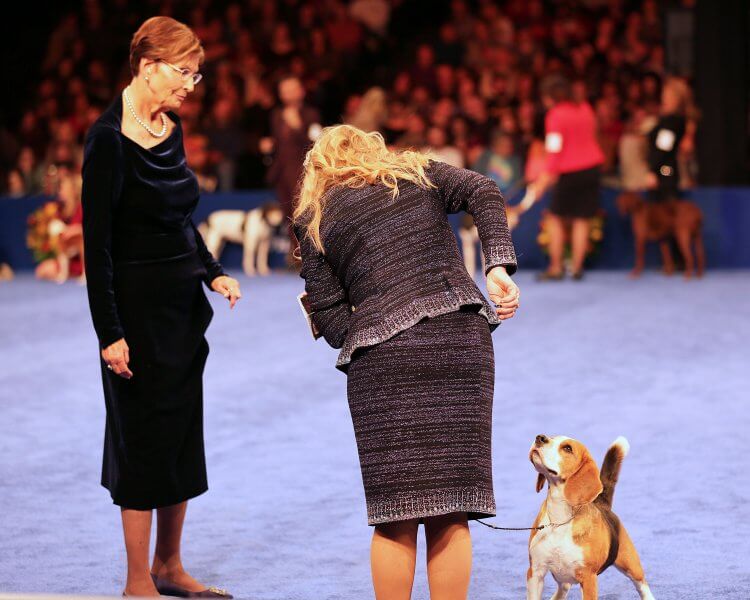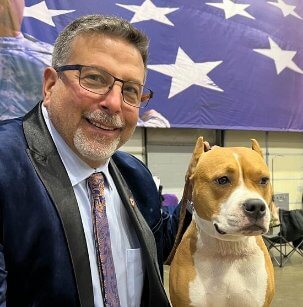Psychology of Dog Show Judging – As a person who has been involved in AKC conformation dog shows for more than four decades, I have often pondered the decision-making process that goes into judging. If you are involved in this sport, you have seen and most likely have been affected by a judge’s decision that appeared to be antithetical. The emotional fallout from such of loss can be anger or even depression. From a psychological perspective, the angst that we all feel when affected by a decision that appears to be a “contradiction” is caused by “Cognitive Dissonance,” which refers to the mental conflict that occurs when a person’s behaviors and beliefs do not align. Cognitive Dissonance is considered one of the primary causes of both anxiety and depression.
My goal in writing this brief article is to highlight a few issues in decision-making that can affect how dog show judges make their selections, and in doing so, reduce some of the discomfort when you are affected personally by a judge’s decision. On the other hand, if before reading this article you believed that judge’s decisions are based entirely on breed standards, you may learn that this is not necessarily the case, nor is it true in most cases where reason should guide decisions. We don’t have to look too far in our everyday world to see that reason is not our principal guide and that most of us are more like Star Trek’s emotionally driven James T. Kirk than we are the rational, even-tempered Mr. Spock. This is true because our “cognitive machinery,” the brain and the information that makes up its operating system, has evolved to make decisions quickly and almost unconsciously. This ability enhances our ability to survive in a world where we are thrown into rapidly changing situations.
To examine this topic effectively, we must first understand one precept that should be obvious but is often ignored or forgotten, not only in dog shows but every time someone makes a decision. This is that “perception,” which governs our rationale for making decisions, is subjective and individual and based upon the sum of our experiences and our learned knowledge. The biases that we carry into any situation stem from a lifetime of programing and are reflected in our decision-making.
To pull an example from a recent dog show, I was watching two very nice bitches compete for Winners Bitch. While a coin toss might have settled this adequately, a keen observer who knew the judge for many years speculated that the judge, as a Parson Russell Terrier breeder, would prefer the longer-necked bitch. As predicted, she did choose the longer-necked bitch as Winners Bitch. I watched her judge other breeds and, it could just be happenstance, she did appear to prefer longer-necked dogs.
We all have our quirks, and this includes judges. While we might all use the same list of variables, each one of us assigns different weights to each individual variable. Consider this list of relevant features and try to put them in order as if you were the one judging: movement, coat, bite, head shape, ear-set, tail-set, feet, front, rear, topline, color, markings, eye-shape.
On paper, this might seem like a doable task. But when faced with a variety of dogs that need to be evaluated in under three minutes per dog, your mind unconsciously will default to your unconscious weighting and preferences that will determine your decision. We must embrace the idea that there are unconscious mental processes underlying every decision that is made in the ring. You might not agree with the judge’s decision, but keep in mind that you are also not viewing the world through their eyes.
Beyond the individual subjectivity of one’s personal experiential and cognitive reality, there are other decision-making factors that lay at the core of our wiring, that affect our decision-making in most situations. Any of these encoded, biased, decision-making mechanisms developed over our evolution to aid us in making rapid decisions that encourage the survival of the species. The term given to these unconsciously biased decisions is “heuristics.”
“A heuristic is a mental shortcut that allows an individual to make a decision, pass judgment, or solve a problem quickly and with minimal mental effort. While heuristics can reduce the burden of decision-making, and free up limited cognitive resources, they can also be costly when they lead individuals to miss critical information or act on unjust biases.”
Reading the definition, one might ask why a judge making a critical decision would use “mental shortcuts” when making what should be a rational decision. We don’t do it consciously, but we do it all the time. We only have limited cognitive resources and it would be impossible to judge a group of dogs without heuristic thinking in under three minutes per dog, while running the entire breed standard through one’s head. There are a variety of heuristics that bias our decision-making, but for the sake of brevity, I will focus on one common heuristic that is often found in dog show judging:
Representativeness Heuristic.
Representativeness Heuristic is a bias caused by the mind’s tendency to group like things and events together in the process of making decisions. Since this is a process that can apply to almost every decision we make, it is not hard to find examples in dog show judging. Let me share a few examples that most of us can relate too. In one of the breeds that I pay extra attention to, the dogs come in a wide variety of colors and patterns. Is it mere coincidence that the last top-winning dog and the current dog that is rising to the top of the breed rankings have almost the same exact markings? In another example, “Handler A” has historically bred and shown the top-winning dogs in their breed, and they continue to win with these dogs over all comers. Are their dogs unmatched or is there a possible cognitive bias at work? What is ironic about this very human behavior is that we all engage in playing “the mental match game” and make decisions based on our personal experiences. One of the reasons we do this is to “reduce cognitive load,” which brings us to our next topic: Cognitive Ease.
“Cognitive Ease” is a principle which states that we prefer to make decisions in the simplest manner possible, using rules of thumb or heuristic strategies rather than doing the “mental heavy lifting” that might produce the best decision. Every decision we make uses up part of our limited mental resources. When we are forced to do intense thinking to solve a problem, we experience cognitive drain, anxiety, and pain. If you have ever taken a college statistics course, you can probably relate to the mental strain it causes for most students. While we expect a judge to mentally access the entire breed standard, hold the standard in their “working memory,” and award each dog according to their merit, this is almost impossible. Studies have shown that an individual can only hold between three and four items in their “working memory.” Breed standards have far more than four variables, as well as the judges’ need to assess movement and presentation, so judges are forced to use the available data alongside heuristic strategies to make their best decisions. While we would all like to think that the dog that is the best dog should win, I have given you some food for thought to see why this is not entirely true.
I can tell you from my interactions with judges, most are consciously engaged in making the best decision possible. However, as I have related in this article, it is not an easy task and there are a ton of variables that affect each decision. Keep in mind, judging is fundamentally a subjective enterprise. All we can do to influence the outcome is to do the best job with our individual dogs and to present each dog in such a manner that it looks like a good representation of the breed standard, groomed appropriately, and shown well. If you’re not certain about any aspect of how to do this, find a person in your breed who is willing to give you fair and objective advice so that you can present your dog in the best way possible.
I can only hope that the little insight I have provided will possibly mitigate some of the negative emotions that we experience when things do not go your way. I understand that nobody exhibits a dog with the intention of losing, and nobody likes losing, so control the variables that you can, do your best job, and have fun.
Representativeness Heuristic is a bias caused by the mind’s tendency to group like things and events together in the process of making decisions. Since this is a process that can apply to almost every decision we make, it is not hard to find examples in dog show judging.
Psychology of Dog Show Judging – It’s Not Just About Breed Standards
By Michael Nelinson









